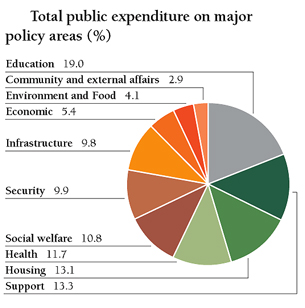![]()


The 2001/2002 Budget at a glance
|
Total public expenditure |
HK$290.665 billion
|
|
Government expenditure |
HK$252.670 billion
|
|
Deficit |
HK$2.97 billion
|
|
Fiscal reserves (at 31-3-02) |
HK$429.94 billion
|

Maintaining steady economic growth, addressing the needs of the community, controlling government expenditure and striving to achieve a fiscal balance were the focus of the 2001/02 Budget delivered on March 7.
The budget, entitled 'Honing our strengths, striving to excel' also proposed modest increases in several non-livelihood related taxes and fees. It was the sixth and final Budget delivered by the then Financial Secretary, Mr Donald Tsang, before taking up his new post as Chief Secretary for Administration on May 1.
Plans were outlined to reinforce Hong Kong's economic partnership with mainland China, and to turn Hong Kong's strengths into a competitive advantage to become the world city of Asia and an international financial centre, 'providing an unrivalled breadth and depth of financial and high value-added services'.
A revised forecast deficit of HK$11.4 billion (US$1.46 billion) was announced for the 2000/01 financial year, higher than the original estimate of HK$6.2 billion (US$795 million). This was due largely to lower than forecast revenues from land sales, proceeds from the partial privatisation of the MTR and investment return on the fiscal reserves, partly offset by lower than expected expenditure.
For 2001/02, a small deficit of about HK$3 billion (US$385 million) was budgeted. An essentially balanced budget was forecast for each year to 2004/05. Successive operating deficits, expected to continue until 2004/05, were a matter for concern in view of the possible knock-on effects on the long-term financial health of the government.
To help balance the books, a number of specific revenue-raising measures were announced, including increases in: tobacco duty; duty on alcoholic beverages (except wine and strong spirits); and air passenger departure tax, that was also extended to include helicopter passengers for the first time.
Two tax concessions were announced to help Hong Kong's development: an increase in the maximum deduction for self-education expenses under salaries tax to help encourage lifelong learning; a decrease in stamp duty on stock transactions to 0.2% (from 0.225%) per round transaction to help maintain Hong Kong's position as an international financial centre.
Additional resources were allocated to assist the disabled, youth at risk and people with low educational attainment.
A two-year freeze on civil service recruitment was lifted following further progress in implementing public sector reforms, which included the accumulated savings of HK$3.4 billion (US$436 million) from an enhanced productivity programme since 2000/01.
Consideration is also being given to further corporatising or privatising individual assets to enhance efficiency and service quality, and bring to the market additional high-value investment opportunities.
(Top)